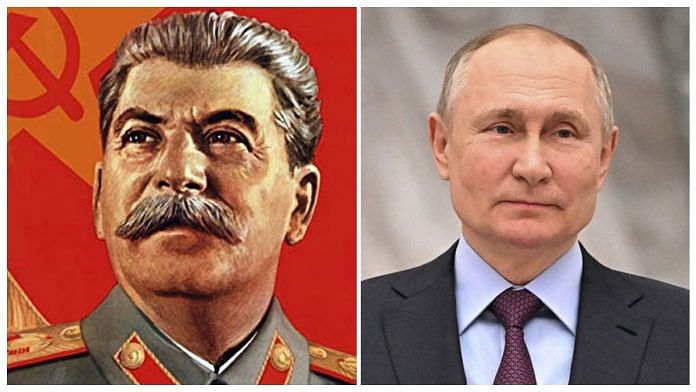New Delhi: A “21st-century Stalin”, “re-Stalinising Russia”, “channelling Stalin” – these are some of the many phrases used by mainstream Western media in recent weeks to describe Vladimir Putin’s style of leadership amid the war in Ukraine, especially after the Russian President delivered a strongly worded speech on 17 March lashing out at Russian “traitors”.
“The collective West is trying to divide our society using, to its own advantage, combat losses and the socioeconomic consequences of the sanctions, and to provoke civil unrest in Russia and use its fifth column in an attempt to achieve this goal,” he said.
He also distinguished “true patriots” from “scum and traitors”.
Experts like British historian Simon Sebag Montefiore were quick to point out that the vocabulary was reminiscent of Soviet dictator Joseph Stalin’s rhetoric during his campaign of political repression known as the ‘Great Purge’ that began in 1937.
Traitors. Scum. Purification. Enemies. Putin’s speech and vocabulary back to 1937.
— S Sebag Montefiore (@simonmontefiore) March 16, 2022
Meanwhile, newspapers like The Telegraph UK observed that Putin used the Russian word samoochishchenie, which comes from the same root as chistka, used to describe the Great Purge.
Apart from the language, experts have also pointed out other similarities between Putin and Stalin based on their creation of a cult of fear, restrictions on free speech and free association, heading down a path of isolation. They have noted that Stalin’s secret police force is still intact and remains central to Putin’s reign.
Also, the stiffer-than-expected resistance from the Ukrainian armed forces has started to spark memories of Stalin’s botched invasion of Finland in 1939 — where success came at a very heavy price for Russia.
Then again, the circumstances are different. Stalin was a Marxist while Putin is a 21st-century populist and authoritarian, observed Montefiore in a piece for British magazine New Statesman. More so, the Russia of today is more urbanised with higher levels of education compared to Stalin’s USSR which was plagued by poverty and famine.
Among other similarities, Putin is the same age as Stalin when he blockaded Berlin — 69 — and the former’s grandfather is said to have served as Stalin’s cook.
As Yoshiro Ikeda, associate professor at the University of Tokyo, puts it, the two men share the same vision as former Prime Minister of the Russian Empire, Pyotr Stolypin (1862-1911), who intended to unite Russians, Ukrainians and Belarusians under a “common Slavic banner”.
Also Read: Putin should just change Russia map to include Ukraine, like we did with Kashmir: Gen Twitter
Understanding Russians
Described as the “chief architect of Soviet totalitarianism”, Stalin led the erstwhile USSR from 1928 to 1953. Former intelligence agent Putin, meanwhile, first ascended to office in 1999.
In an interview with The New Yorker, American historian Stephen Kotkin, who has authored books on Stalin, said Russian history has always conflated the country with a despotic ruler.
“We had this debate about Iraq. Was Iraq the way it was because of Saddam, or was Saddam the way he was because of Iraq? In other words, there’s the personality, which can’t be denied, but there are also structural factors that shape the personality,” added Kotkin.
“One of the arguments I made in my Stalin book was that being the dictator, being in charge of Russian power in the world in those circumstances and in that time period, made Stalin who he was and not the other way around,” he added.
Russian leadership had an air of exceptionalism, almost an entitlement to be a great power, but it was unable to match that in reality, he said.
Asked if Putin was a “madman” for invading Ukraine, Montefiore, who has also authored books on Stalin, said in an interview with The Sydney Morning Herald earlier this week the Russian leader was merely projecting a vision of Russia that many young Russians were brought up with during the Soviet era — a vision of the Russian state as an empire that has to expand.
Repression
While he hasn’t gone to the extent of implementing gulags, Putin has muzzled freedom of speech in Russia amid the Ukraine war.
On 4 March, he ushered in a harsh new media law that threatens prison terms of up to 15 years for spreading “fake news” about the Russian military or calling for sanctions against the country.
Access to foreign press outlets like the BBC has also been restricted, and social media giant Facebook blocked in the country.
Despite the restrictions, mass anti-war protests have continued in parts of Russia. More than 15,000 people have been arrested and Kremlin critic Alexei Navalny’s prison sentence was extended to nine years Wednesday.
Repression followed a different road map under Stalin. An estimated 20 million or 2 crore died in labour camps, forced collectivisation, famine and executions under his reign — almost the same as the number of Soviet soldiers and civilians said to have died in World War 2.
Amid the ongoing war, about 2 lakh Russians have fled their country. Meanwhile, an estimated 40 million people were displaced or blacklisted during Stalin’s reign.
Putin has disagreed with Stalinist policies in the past — most recently, he has blamed him and Lenin for wrongfully handing Russian lands over to Ukraine. He has also described Stalin’s methods as “unacceptable” and criticised his personality cult.
Even so, he has been accused of “rehabilitating” Stalin.
In December 2008, for example, Russian authorities confiscated 12 hard drives and other documents from the St. Petersburg offices of Memorial, a civil rights group that had pioneered research into Stalinist repressions since 1987.
(Edited by Sunanda Ranjan)
Also Read: 3 ways to look at Russia-Ukraine war — starting with ‘Bad’ Putin



